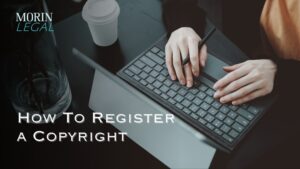Registering a copyright is something I am always happy to help my clients with but, with a little bit of time and patience, it is also something that you can do yourself.
According to Copyright.gov, copyright is “a type of intellectual property that protects original works of authorship as soon as an author fixes the work in a tangible form of expression. In copyright law, there are a lot of different types of works, including paintings, photographs, illustrations, musical compositions, sound recordings, computer programs, books, etc.”
In other words, copyright protects your original creative works from being copied or used without your permission. Copyright law protects your work as soon as you have created it but there are major benefits to registering your copyright.
One, copyright registration creates the presumption of ownership and a public record of your work. Two, it allows you to sue for different types of unauthorized use of your work. Three, and most importantly, if you do sue, you’ll be entitled to statutory damages, making it more likely to financially recover from costs.
How To Register a Copyright

The registration application has 12 parts. First, it will ask you to identify what types of work you are registering. There are six categories:
- Literary Work: Including Fiction, Non-Fiction, Poetry, Articles, and Periodicals.
- Work of the Visual Arts: Including Artwork, Illustrations, Jewelry, Fabric, and Architecture.
- Performing Arts: Including Music, Lyrics, Sound Recordings, Scripts, and Stage Plays.
- Photographs: Including News Photos, Selfies, Wedding Photos, and Family Photos.
- Motion Picture/ Audiovisual: Including Film, Television Shows, Video Games, Animation, and Videos.
- Other Digital Content: Including Computer Programs, Databases, Blogs, and Websites.

As you continue the application you will find these sections:
- Titles: You will provide the title of the work and any title it may have previously had.
- Publication/Completion: You provide the date of legal publication. Legal publication exists only when a work has been sold, or delivered to a third party for sale or otherwise for distribution. Legal publication is not merely displaying your work online. If the work is not legally published, insert the completion date (e.g., the date the final cut of a motion picture is made).
- Authors: Information about anyone who contributed to the work and what their role was.
- Claimants: Here you provided information about the claimants which in some cases may be the Author, but could also be an organization such as a record company, publishing house, or movie studio. If the Claimant is a different party than the Author, an explanation for how the Claimant has the copyright is required (e.g. a contractual transfer of rights).
- Limitations Of Claim: Here’s where you will list any limitations on your claim, for example, your song samples an older song.
- Rights and Permissions: This is where you will provide contact information for anyone who may want permission to use your work. This could be you, an organization, or your rights administration service.
- Correspondent: Provides contact information for the correspondent, most likely yourself (and always your attorney if you hire one to represent you), whom the copyright office will contact with any questions.
- Mail Certificate: This will be the address you’d like the certificate to be mailed to once the registration is approved.
- Special Handling: This section is where you would request expedited services if needed. Works can take 3 to 8 months to register. This is a problem if you use federal courts to enforce your copyright. Special Handling costs hundreds of dollars. Fortunately, the newly launched Copyright Claims Board (CCB) does not require that your work be registered (only that your application is filed) prior to filing a claim.

Next, you will be prompted to pay the filing fee which will vary depending on the type of work you are registering and you can find the up-to-date fee information.
The final step of the application process is depositing an example of your work for the Library of Congress. Even when applying online your work must be submitted such as a hard copy, either in print form or on a CD-ROM. Other removable media such as a flash drive, won’t be accepted.
As mentioned previously, you don’t technically need to register your copyright, but doing so can save you a headache down the road if someone uses your work without your permission. The registration process isn’t always intuitive and with certain types of work, you’ll need to take extra steps in ensuring the application is filled out right.
For example, every recorded song has two copyrights: one for the sound recording and one for the musical composition and lyrics. You can register both copyrights at once or you may choose to claim Sound Recording for your application to register both (subject to certain restrictions). Later in the application, you must specify you are the author of the lyrics and music as well. If you are not, then you cannot use the application for copyright of a sound recording (form SR) to cover the musical composition and lyrics (form PA) and instead must file distinct applications.
The approval process can take 8-14 months.
While it is possible to complete a copyright application yourself, the help of a copyright lawyer can smooth out the process and ensure the application isn’t rejected because of an error. Because the approval process can take so long, making sure everything is in order with a copyright attorney will prevent you from having to spend more money and start the process all over again.
This is why it can be beneficial to bring a copyright lawyer in on the process. Because of my expertise and years of experience I’m not only able to make sure your application is filled out correctly, but can make sure that you’re registering every available copyright in your work. I also can help advise you when it comes to setting up a legal entity around your copyrights, which are descendible property that can earn income for your heirs long after you are deceased.
If you’re ready to consult with a copyright lawyer about your work and potential copyright protection, you can sign up for a free consultation with me.




